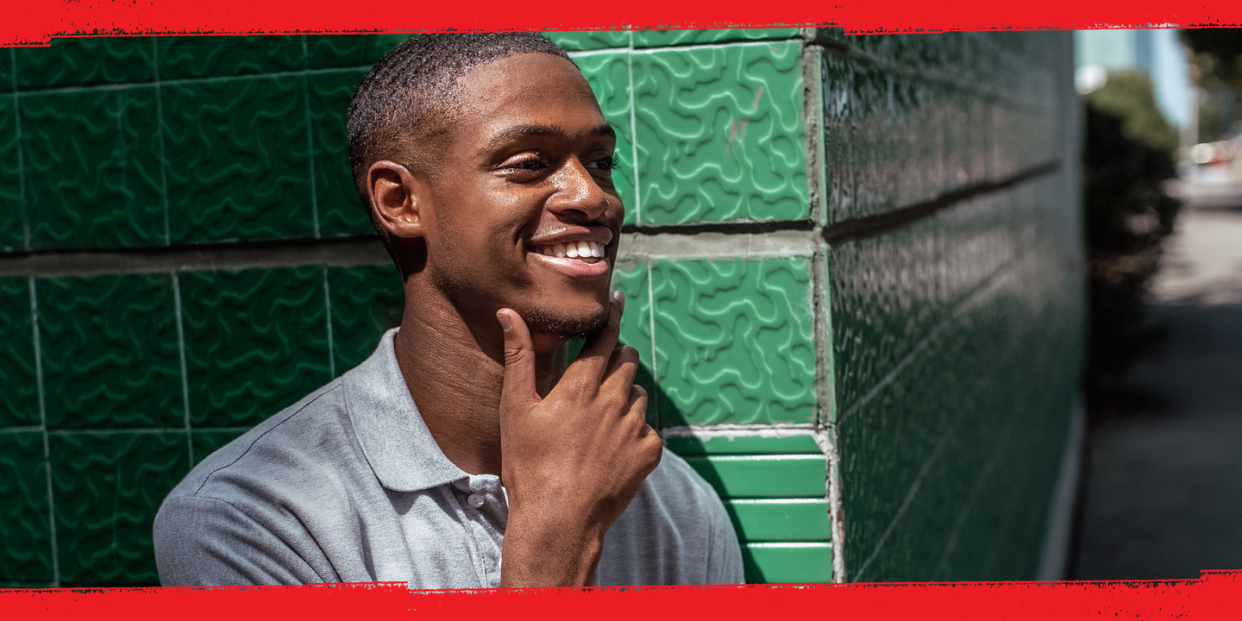This Young Black Activist Harnesses Each Moment to Make Real Change

This story is part of The 2020 Project, a Men's Health special project that explores the lives of 20 different 20-year-old men across America. To learn more about the others, go here.
AS A KID growing up in South Carolina, Righteous Keitt came of age in the era of caught-on-camera police killings. “Since I was nine, I can remember Black people being shot on camera, and those videos going viral, and then nothing happening,” he told a television news crew early this summer after yet another horrific murder—the killing of George Floyd by Minneapolis police officers, captured by bystanders and then shared on social media to add important fuel to the Black Lives Matter movement.
“We need radical change,” Keitt says today.
Keitt is a political-science and public-policy major at UNC-Chapel Hill. That he has figured out how to broadcast his own message—over the airwaves, on social media, and even in public forums, resulting in policy shifts—shows that the young activist has internalized some lessons from the past half century of civil-rights movements and is adapting them in new ways to push urgently for change.
It starts with coalition building. Keitt is a member of Black Men United, a campus group that can turn out hundreds of supporters for nonviolent marches and protests. For years he’s built other allies through community leadership groups like GenerationNation’s Charlotte-Mecklenburg Youth Council.
There’s also a bit of inventiveness involved. When he recognized that during protests in Charlotte, some people might use disorder to their advantage, he printed signs with a crown and the message this is a black-owned business to deter looters from hitting some local stores (and then informed news crews to spread the word).
When, despite his efforts, a local jewelry store was robbed, he started a GoFundMe campaign, raising more than $15,000 to cover its losses. But the most important thing to remember, he says, is that every action is just that—an action. “The job of each person is to make sure that they’re helping the greatest they possibly can and not just posting things for the few likes, right?”

And the result is a ripple effect. This summer, Keitt led a Black Lives Matter rally with Black Men United at Charlotte’s Marshall Park. Through a bullhorn, he chanted, “All lives can’t matter until Black lives matter!” On another day, he appeared on a panel alongside the Charlotte-Mecklenburg police chief and other local activists and encouraged defunding the police. He shares all of this on Instagram. “I try to use the platforms that I’ve been given to let other people know that these are the things that need to be changed.”
Growing up, Keitt had to change his own outlook. He was born in Rock Hill, South Carolina, otherwise known as Football City USA, which has produced NFL greats like Jadeveon Clowney and Stephon Gilmore. His dad went to prison before he was born, and his stepfather helped his mother raise him. For years, Keitt was convinced he’d have to play football to get ahead, even as he consistently failed to make the team. “Coming from that background . . . if you’re a Black man, your options feel very limited in what you can do,” he says.

By the time he was a freshman in high school, his family had moved to Charlotte, and when Keitt broke his wrist, it meant he had to stop playing sports entirely. But while he was sitting around the house, his mom asked him a question: “Are you doing your part?” It was her way of suggesting he help out at home, but over time Keitt realized that many people around him needed a hand. As a sophomore, he saved his money to start a nonprofit, Bags 4 Bagless, which donates toiletries in lightweight backpacks to the homeless, an effort that continues to pass out a couple hundred bags locally each year.
Earlier this year, the Charlotte police deployed tear gas against protesters. After public pressure from Keitt and others, the city council blocked funding to the department for chemical agents. It’s a start, but Keitt has plenty more reforms in mind—to address housing practices, gerrymandering, and the need to stabilize communities. He hopes his generation will take steps to secure its own place within the halls of power.
“I just want change from where we are, because it needs to happen,” he says. “My goal is that it just spreads. So that even if I’m not the one that’s making the change, you know, hopefully someone down the road, whether it be five years or 50 years, is actively making that push.”
You Might Also Like

